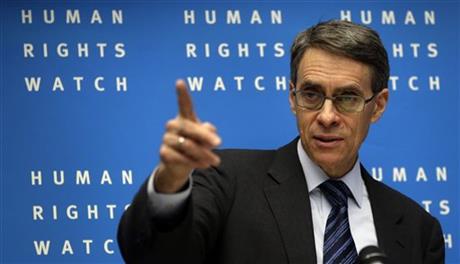
By FRANK JORDANS
Kenneth Roth, Executive Director of Human Rights Watch, speaks during the annual press conference of the non governmental organization in Berlin, Germany, Tuesday, Jan. 21, 2014. The leading human rights group is accusing the United States of undermining efforts to bring the regime of Syria’s President Bashar Assad before the International Criminal Court. The New York-based Human Rights Watch says also Russia and China have consistently shielded Syria from concrete action at the United Nations such as arms embargoes. (AP Photo/Michael Sohn)
Germany Syria Human Rights
Kenneth Roth, Executive Director of Human Rights Watch, speaks during the annual press conference of the non governmental organization in Berlin, Germany, Tuesday, Jan. 21, 2014. The leading human rights group is accusing the United States of undermining efforts to bring the regime of Syria’s President Bashar Assad before the International Criminal Court. The New York-based Human Rights Watch says also Russia and China have consistently shielded Syria from concrete action at the United Nations such as arms embargoes. (AP Photo/Michael Sohn)
Prev 1 of 2 Next
BERLIN (AP) — A leading human rights group accused the United States and other world powers Tuesday of undermining efforts to bring Syrian President Bashar Assad before the International Criminal Court.
The New York-based Human Rights Watch said the U.S. had focused too strongly on bringing the warring parties together for peace talks at the expense of putting “real pressure” on Assad’s regime to end atrocities and hold those responsible to account.
The group also accused Russia and China of shielding their ally Syria from concrete action at the United Nations, such as arms embargoes.
“We cannot afford to wait for the distant prospect of a peace accord before the killing of 5,000 civilians a month comes to an end,” Kenneth Roth, executive director of Human Rights Watch, told reporters as he presented the group’s annual report in Berlin. “The mass atrocities being committed in Syria should be a parallel focus of the peace process.”
Human Rights Watch said the United States had “its own reasons” for opposing the referral of Syria to the Hague-based International Criminal Court, including concerns that this could have legal implications for U.S. ally Israel. But Washington has also been reluctant to lean on Russia for fear of jeopardizing diplomatic efforts to bring all parties together for a peace conference in Switzerland this week.
Roth said he hoped a document this week on the killing of prisoners by Assad’s forces would push U.S. Secretary of State John Kerry to call for an immediate end to atrocities in the same way that a chemical arms attack near Damascus last year resulted in swift international action.
The document, commissioned by the Qatar government and first published by the Guardian newspaper and CNN, was written by three former war crimes prosecutors. It contains substantial photographic evidence of torture and executions by the Assad regime.
“The pictures will make it that much harder to ignore the mass atrocities being committed by Assad,” Roth told The Associated Press. “So far Kerry’s only answer to the atrocities has been: ‘Oh we’re trying to build peace, when we have peace the atrocities are going to stop.’ But that’s not an adequate answer when peace is going to be a long time coming and people are being killed every single day.”
In its 667-page report, the group contrasts the handling of the three-year conflict in Syria with the international community’s swift reaction in Central African Republic, South Sudan and Congo. There, the international community took seriously its “responsibility to protect” — a decade-old U.N. doctrine to prevent genocide — by sending in troops to protect civilians from attack.
Human Rights Watch identified a new trend it called “abusive majoritarianism” last year. The idea implies authoritarian rule by a government that has, or claims to have, an overwhelming democratic mandate which it uses to suppress minorities.
The group cited the Muslim Brotherhood and subsequent military government in Egypt as a prime example, but also included the suppression of dissent in Turkey and anti-gay measures in Russia and Africa.
Roth also slammed as insufficient President Barack Obama’s announcement to reform how the National Security Agency conducts its surveillance.
“(Obama) didn’t move past this discredited, out-of-date view that we have no privacy rights in the metadata because we shared it with the phone company or the Internet company,” Roth said.
___



